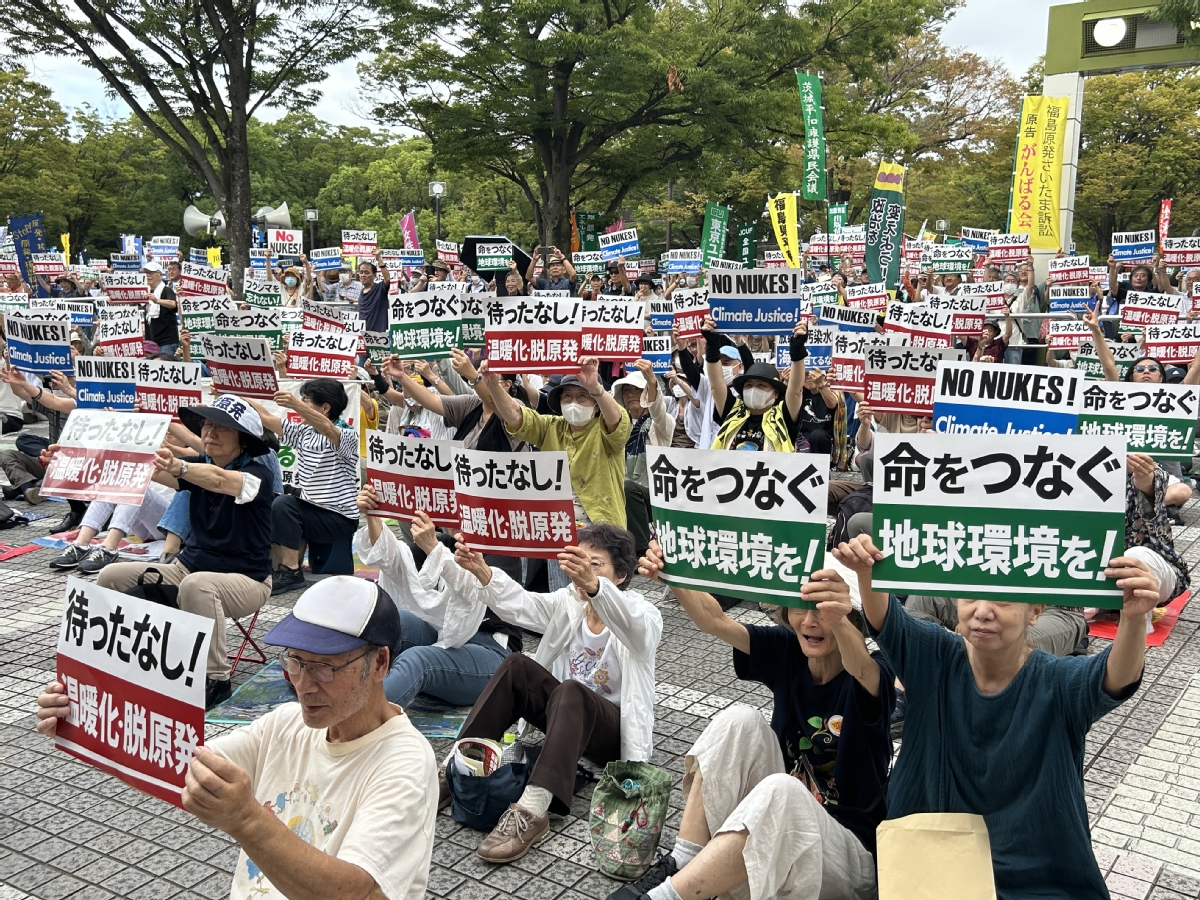Tokyo rally demands an end to water discharge
By JIANG XUEQING in Tokyo | China Daily Global | Updated: 2024-09-18 10:08

At an anti-nuclear power rally in Tokyo on Monday, Japanese citizens renewed their calls for an immediate halt to the ocean discharge of contaminated water from the crippled Fukushima Daiichi Nuclear Power Plant.
The event drew 5,000 participants from across Japan, with the organizer, a local citizens' group, expressing its goal to expand the movement nationwide.
Chiyo Oda, co-director of the Citizens' Conference to Condemn Further Pollution of the Ocean, a nonprofit organization based in Iwaki, Fukushima Prefecture, criticized the ongoing discharge.
She noted that, despite widespread opposition and broken promises to the fisheries community, the ocean release continues, with numerous contradictions and injustices remaining unaddressed.
Oda added that previous claims, such as the lack of space for additional storage tanks or the lower cost of releasing contaminated water into the sea, have lost credibility. The justification of needing storage for debris removal is also becoming less convincing given the current state of the cleanup efforts.
"We are repeatedly told that decommissioning is essential for recovery, and for that, the removal of debris is necessary. However, is it really possible to safely remove such dangerous debris? And what will they do after removing it? The ultimate form of the decommissioning process has not been discussed, and it seems like they are proceeding blindly," said Oda.
Furthermore, not only tritium but also other radioactive substances, such as strontium and carbon-14, remain in the water after being released. Even the dangers of tritium itself have not been adequately explained, she added.
Thirteen and a half years have passed since the triple meltdown at the Fukushima plant, which was triggered by the 9.0-magnitude Great East Japan earthquake and the subsequent tsunami in March 2011. Despite the severe damage, local fishermen still wish to continue their work and persist in opposing the ocean discharge of contaminated water.
However, the local fishing industry in Fukushima seems to be overwhelmed by a deep sense of exhaustion. The number of fish markets in the region has dwindled and supermarkets are now selling fish caught in other prefectures.
Insufficient explanation
On Aug 24, which marked a year after the ocean discharge began, Japanese Prime Minister Fumio Kishida visited Iwaki, where he praised the local sashimi as "delicious" and assured the head of the fisheries cooperative that he would take full responsibility for the discharge until the end.
"I can't help but wonder what he's talking about, imposing a life on the residents where they can't honestly say the fish are good like they could before the accident," said Oda.
Following the nuclear disaster, Tokyo Electric Power Company, or TEPCO, the operator of the Fukushima Daiichi plant, and the Japanese government are now deliberately releasing radiation from the incident into the global environment, she added. This process began without sufficient explanation or the public's consent, making it completely unacceptable, Oda said.
"Our concern is the long-term impact of radiation, and we refuse to allow further contamination of the Earth's environment," she said.
At the rally, participants voiced their concerns about the determination of the Japanese government and power companies to restart nuclear reactors, despite operating with aging and deteriorating facilities, and regardless of the potential for large earthquakes.
Satoshi Kamata, a writer, said: "When you look at the promises being made in the current Liberal Democratic Party leadership race, they're focused on restarting nuclear power plants … They are completely disregarding the lives of the people, yet these candidates are leading the race."
























